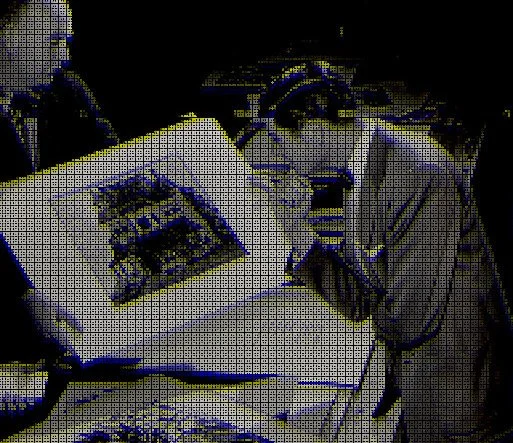ELIZABETH J. WENGER / WHERE THE OILMAN LIVED
I knew that the museum had belonged to an oilman. Or not the museum, but the mansion that became the museum.
I knew that the gardens behind the museum were not mine, but I could walk easily into them. For my whole childhood, I lived a few blocks from where the oilman had lived in the 1920s, and even as a kid it was no trek to go down one hill, up another, and come to that place and enter its gardens. In the lawns, I could see the sculptures of brass sheep which always looked so real from afar yet so cold up close, and the fake trees made of glass and copper, and the fountains and ponds with large fish swimming not at all far from the surface—all of it I could see as if it were mine.
I would pretend to be an oilman and amble through the halls of the mansion. Above me would be the vaulted ceilings with the little cherubs painted on them. I could walk into what used to be the oilman’s bedroom, with its brick floors and astounding fireplace. I could shimmy and jive over the dance floor that the oilman’s wife had paid to have installed so she could host people from the coasts and throw parties on a floor that lit up, just like magic, right in her (my) own home. I could picture it, all those 1920s people dancing in the opulence.
I had favorite paintings, and though much of the art wasn’t there until after the oilman had donated his home to become a museum, I still liked to pretend that the art was in my mansion. Liked to pretend that I was an oilman and that, just as all the gardens and all the oil and all the money were mine, all the paintings were mine, too. The Sheperdess by Bouguereau in my foyer would stare at me with those placid eyes, her forearms supple and strong bent over a staff, the colors muted. And upstairs, in my guest bedroom, Moran’s An Angry Sea, with roiling waves tossing about one helpless log. That painting could terrify, but alas! I was safe in my mansion and oh so far from the sea. Then there was Erosion No. 2 – Mother Earth Laid Bare by Alexandre Hogue who’d made dry earth take the form of a buxom woman nestled in the cracks of the ground.
Upstairs, through one of my halls, was Stephen Standing Bear’s The Battle of Little Big Horn, the bloody scene sketched out on one long sheet of muslin. And in another of my many rooms hung Oil and the West by Frank Mechau with the oil rig, a familiar sight in Oklahoma, on the far right, and one lonesome cowboy walking by a flat, lonesome building on the left.
But I did not often go into the museum proper since that required a ticket. I stuck mostly to my gardens. They were free when I was younger. No admissions desk, no ticket. You could walk right into the acreage and look about at whatever pleased you. But at some point, they stopped all that and built a gate around the place. You had to buy a ticket just to see the flowers. And I was no longer the owner of that manor. I could not be an oilman, not even in my dreams. The gardens were closed, and that was that.
Perhaps no one in the city was so disappointed in the closure of the gardens as my dad. He loved that place, loved being able to take us kids into the lawn whenever he wanted. So it's no surprise that years after they closed them, when walking home from a friend’s house after a night of drinking, he took a turn toward the museum and decided to have himself a stroll around the grounds. He’d have them all to himself, seeing as no one could enter the gardens with or without a ticket at that time of night.
He climbed the gate, which is quite the feat for my dad who, though not unstrong, was certainly not athletic. Whatever grace my dad possessed was hindered by the copious amounts of beer he’d drunk, and once he reached the top of the gate, he threw himself onto the ground, a move that stubbed his thumb and left his ass bruised to hell though he wouldn’t know that till the next day. He wandered for some time through those gardens under the moon. He was the only man among them, just as the oilman might once have strolled under the same moon almost a hundred years before, back when the gardens were the oilman’s domain.
I like to picture my dad as he wandered about aimlessly, meandering over to the grotto, where visitors sometimes left notes tucked between the rocks. He bent over the koi pond and peered into the water’s mirror surface, seeing his face reflected: bald head, glasses, and a black goatee which covered the lower-half of his face.
(I remember the only time I ever saw him shaved. I walked into my parents bedroom in the morning to find a strange man putting on my dad’s shoes. This man had a chin and a jaw—the face of child, really. What a shock it was: my dad had two faces. I was glad when his other one finally grew back and once again I had a man for a dad.)
When my dad decided he’d had his fill of the gardens, he set out on his merry way home. But this is where it got tricky. It turned out that the spot in the gate he’d been able to use as an entrance wasn’t as good for an exit. He had to find another way out. So he followed the stretch of Crow Creek that ran through the gardens and out into the neighborhood. At the very back, where the creek twisted into the rest of the town, he found a lower, less sturdy fence. And he simply broke it down, walked out, and came home.
The next morning he woke up with a hangover and a red, swollen thumb—tokens of the previous night’s foray. His ass was literally broken. The fascia of his buttocks split. After the pain and the shame had worn off enough, he showered and walked soberly back to the museum. He walked right up to the front desk with his checkbook in hand and wrote out a donation, telling the woman at the desk he’d broken the fence the night before.
How? And why?
Well you see the thing was, he explained, he’d been walking home from a friend’s house and got distracted by something in the creek, so he’d leaned over it and looked in, and wouldn’t you know it?—his glasses fell clean off his face and into the water. He needed those glasses to work. He was a doctor after all. How could he inspect a sore on a patient’s face or read their temperature without them? So he did what he had to do, and jumped into the creek and followed it all the way onto their grounds to fetch his glasses. One thing led to another and he found himself trapped in their gardens! The only way to get out was to break the fence, you see, and that’s just what he did. Anyway, here’s a check to pay for it. Beautiful gardens by the way. Gorgeous, truly.
The woman at the desk thought it over. She worked there, at the museum, and had naturally fallen under the spell of beauty herself—a spell that was cast on everyone who walked the gardens and the halls of that opulent place. She was a retiree, who’d begun volunteering as a docent at the museum, and liked best of all when it was closing time and she could walk the emptying halls, shutting up shop, all the while pretending to be a child again, the daughter of the oilman. The home was hers and she could run her fingers over the keys of the large organ in the room that led out to the terrace. She could skip up the grand staircase. She liked to go into the small sitting room with pastel murals of nymphs and satyrs frolicking in a mythical idyll. The light was so nice in that room, filtering in and making the little nymphs seem really alive.
The woman had grown up visiting the museum, had seen the collections grow, and seen the visitors come and go, each of them looking at the art as they decided which bedroom would be theirs.
Years ago, after she first retired, she had taken a trip to Europe with her now late husband and visited the Louvre. She hadn’t gone to see the Mona Lisa or Venus de Milo, but to see where and how royalty had lived. Paris was so different from Oklahoma, with its Napoleon and Medieval era and its general Frenchness. She had looked about the Louvre and found it quite to her distaste. It wasn’t a place one could live.
When her husband died, she applied to volunteer at the museum and spent many hours there, eating her lunch in the gardens and petting the cat that darted between the bushes and walked the edge of the fountains. Now this was a place one could live! Anyone would want to possess it. To be there was to understand what oil meant, what money meant, what kind of life could be bought by leeching the blood from the ground. And what was an oilman, really? It didn’t matter anymore, since the time of the oilmen in Oklahoma had come and gone. Though oil was still pumped from wells all about, the oilmen themselves had died off. They’d gone extinct just as the frontier had. All that remained were the things that oil had bought them, things we all wanted. Things she herself wanted.
She looked into the face of this man, my dad, with his wire-rimmed glasses and his t-shirt tucked into his shorts. It didn’t matter that he was lying. It mattered only that he too understood what it was to want these things. To want them all to yourself.
Elizabeth J. Wenger is a queer writer from Tulsa, Oklahoma. Her works have been nominated for the Pushcart Prize and Best of the Net anthology. She is the winner of the Baltimore Review Winter Prize in flash nonfiction and was shortlisted for the Breakwater Review Fiction Prize. Her essay collection was selected as a finalist for the Black Lawrence Press Hudson Prose Prize. Wenger earned her MFA at Iowa State University’s program for Creative Writing and Environment. Her website is wengerwrites.com.

